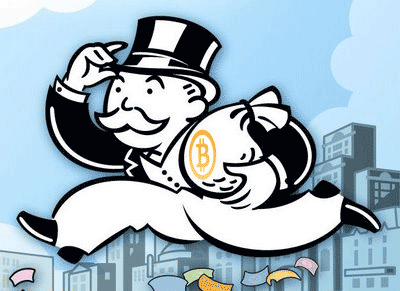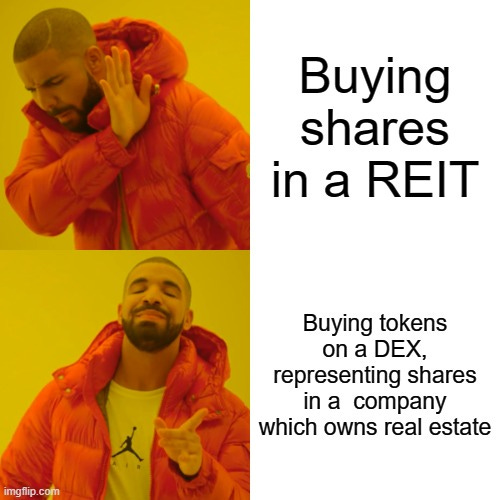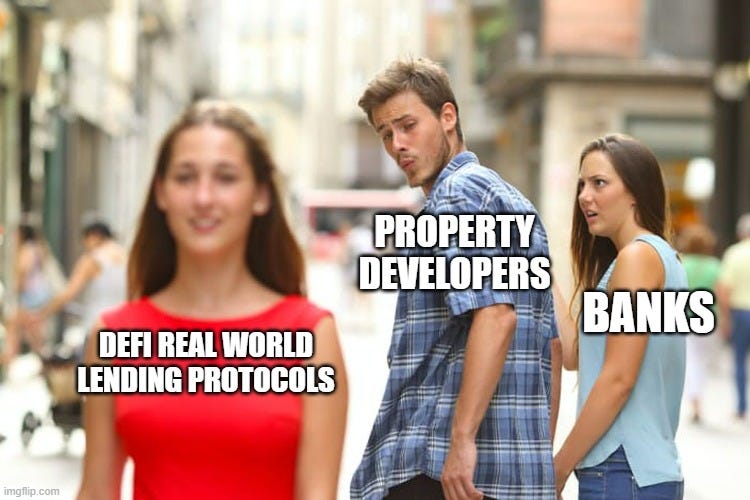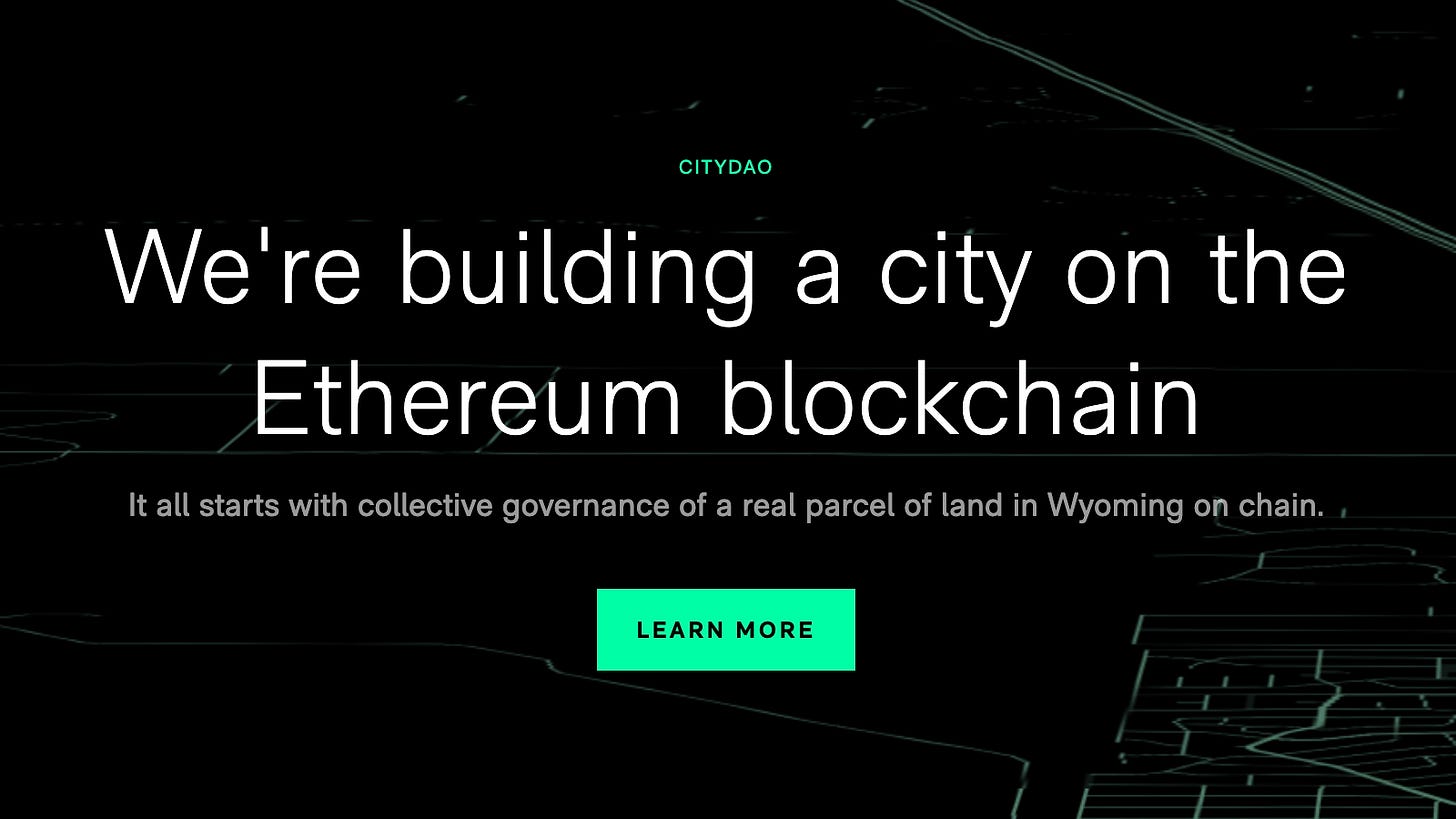How crypto is transforming the real estate market
Crypto has already begun to create new opportunities for fractional ownership / transfer of real estate, on-chain collateralisation (DeFi lending) and DAO collective ownership of property.
Fractional ownership and transfer of real estate
The biggest issue with real estate as an asset class is its illiquidity. At any one point there are only a small number of buyers for each unique asset. The buying and selling process is slow and archaic, preventing people from making transactions frequently.
So wouldn't it be great if real estate could be fractionalised and traded as shares, increasing the number of potential purchasers and reducing frictions to buying and selling?
Well yes, what about a good old fashioned Real Estate Investment Trust (REIT)? REITs allow any old Chad to buy a share in a company which owns real estate, in effect allowing Chad to own a % of the bricks and mortar in the company's portfolio. Chad also gets a portion of the rent, paid in shareholder dividend.
OK great, then why does Chad need the blockchain?
Decentralised Finance ("DeFi") makes assets more liquid by making it easier to transfer fractional ownership of an asset, and increases the number of people who are able to invest in that asset. This reduces frictions to purchasing a the asset and it increases the depth of the market (more buyers and more sellers for the asset).
Investing in a REIT is much harder than swapping tokens on a DeFi exchange. To invest in a REIT, Chad has to sign up for an online stockbroker service which involves paperwork, background checks and five working-days. Equities are heavily permissioned: they have geo-restrictions and are KYC'd. It’s also hard to transfer equities – you generally have to go through a centralised market-place to do so, buying and selling through middle-men rather than directly with the buyer/seller.
Crypto assets have none of these constraints. Using DeFi, Chad can set up a Metamask wallet in two minutes, connect that wallet to a decentralised exchange (DEX) like Uniswap and trade his £ for tokens which represent a share of the underlying real estate asset he's buying. The ease at which people can use DEXs means more people will be able to buy tokenized real estate on a DEX than can currently buy shares in a REIT.
This is good news for real estate, as more participants leads to more liquidity. DeFi could turn one of the world's most illiquid asset classes to almost fully liquid.
DeFi lending against real estate collateral (on-chain securitization)
What if I told you that you can borrow money from the DeFi ecosystem against your real estate. That's right: borrow magic internet money by using real life property as the collateral. Not even metaverse real estate - actual physical bricks & mortar. 🤯
How it works:
A real estate development project will cost £10m. The developer owns the land, which is worth £5m, but they still need to borrow £5m to complete the project.
The developers goes to a DeFi lending protocol (like Maker DAO or Aave) to borrow the £5m. The protocol allows the borrower and the lender to transact with each other in a ‘decentralised’ fashion. The borrower is not going through a centralised body like a bank.
The DeFi lending protocol mints an NFT which represents ownership of the collateral (the land the developer owns). This NFT is locked in a vault in the protocol. Note, NFTs in this context are just digital assets which contain unique data (such as property ownership rights), they have nothing to do with pictures of apes which sell for millions of dollars.
The developer then draws down the £5m they want to borrow from the protocol.
The developer services the loan, paying interest to the protocol.
Eventually the developer pays back the loan in full and the NFT is burned, signifying the release of the collateral.
Source: Centrifuge
This has advantages for both sides of the lending marketplace.
For investors (lender): access to lending opportunities which traditionally are only accessible to institutional lenders. As with purchasing tokens representing ownership of an asset on a DEX above, being able to lend against real estate through DeFi protocols is more accessible to people than registering with a regulated lending platform. And for DeFi diversification, this is secure lending against real world assets with collateral which is *uncorrelated* with price fluctuation in the crypto markets.
For property developers (borrower): they can access liquidity from DeFi protocols quicker, easier and at cheaper rates than from banks.
For both: DeFi eradicates layers upon layers of middle men that exist in the complex chain of development lending. This brings down the cost of capital for both parties (lower interest rates for the developer and higher actual returns for the investor). Banks can be replaced by code that at every stage can be traced and verified.
Going back to the £5m loan: in the current financial system this would be lent out by a bank at 8% interest rate. Remember that this money ultimately originates from you and me, who have cash sitting in a savings account earning us 0.25% interest. Lucky things. Now between the point where we leave our cash in the bank and the developer takes out a loan, there are multiple other parties involved, each taking on additional risk, which protects us from the developer potentially defaulting on their loan. So obviously the risk of us leaving our money in the bank is considerably less than us lending directly to a developer, hence the difference between receiving 0.25% and 8% interest. But is it 32x less risk? Well the beauty of DeFi is that you can actually decide for yourself.
DeFi allows borrowers and lenders to transact directly with each other without the need for middle-men (code instead of companies). Cutting out the middle-man spread means there's more left of the pie to be divided. Whether this means investors get better returns and/or the developer pays less interest is still TBD.
This is early days in the DeFi x Real World Asset market. To date most of the capital has come from DeFi retail investors. But this is changing: Maker DAO aim to have $1bn of real world asset collateral on their balance sheet by the end of 2022. Given their negligible cost of capital (they mint DAI, their stablecoin pegged to the USD, at close to zero cost), their interest rates are super cheap. And everyone loves cheap money.
DAO collective ownership of property
If you don't know what a DAO is, don't sweat it. Most people don't. It's both the sexiest concept to emerge from blockchain technology, as well as the most unsexy acronym: Decentralised Autonomous Organisation.
I think of a DAO as a 'digital co-operative'. A real life co-op is "an autonomous association of persons united voluntarily to meet their common economic, social, and cultural needs and aspirations through a jointly-owned enterprise". A DAO is the same, but it runs on the blockchain and membership is signified by ownership of a token. Like a co-op, a DAO unites people around a common mission and creates its own economy to support that vision. Unlike a co-op, its economy is digitally native. DAOs primarily support ownership of digital assets, not physical assets.
But what if a DAO wants to purchase and manage physical assets, like real estate?
Given most DAOs have no employees and no legal entity, it's not easy. But it is possible. In October 2021, CityDAO purchased 40 acres of land in Wyoming. That's right, a group of 5,000 strangers on the internet (myself included) with no legal entity joining us up, threw around ideas and figured out a way to buy a plot of land together.
What was remarkable is that it took CityDAO just four months to organise, raise capital and purchased a plot of land. The internet allows people to find their people – your 'tribe' if you want to be all millennial. DAOs allow that tribe to organise effectively and come together to own their community (buying the native token of the DAO). Being an owner, as opposed to just a participant, of that community aligns incentives. All members share in the group's success economically.
So DAOs can help communities organise better and pool resources to purchase real estate. That's great for communities, but what does it mean for the real estate market? It means there will be a fundamental re-think about where the value lies within real estate – with the physical asset or with the community that holds the asset?
CityDAO bought 40 acres of land in Wyoming for $150k and then sold membership and voting rights of the community that owns the land for $2.5m, in the form of 10,000 NFTs. Just think about that. They bought physical land for $150k, but the value of the community that owns and governs the land is worth $2.5m. 🤔
This begs the question: is the value in the community or the physical asset? Members are buying participation in and ownership of the community first and part of the parcel of land second. The primary asset is the community, not the physical real estate. If the asset is the community then the value lies in the community first and in the physical real estate second.
The possibilities for DAO ownership of property are endless. DAOs could influence which properties get built, which get funded and how they get funded.
Anyone with eyes can see that the real estate market suffers from a lack of innovation. Finance bros are not paid to take risks and try new things with real estate. They already make good money building ordinary projects for the masses, so why rock the boat?
If DAOs can take control of the funding streams, paying directly for the products they eventually own and manage, this could radically change what properties gets built in the future. For example, property developers don't build eco-homes at-scale today because they cost more to build, hence they cost more for customers to buy. Given how expensive bog-standard homes already are, the market for expensive eco-homes is just not big enough to build them at scale. But if eco-home buyers could organise early, form a DAO, pool funds, influence the design, own and then manage their homes, then yes a developer could build eco-homes at scale because the market has already been created for them.
If you are a property developer this is good news because you are taking on less risk ('forward sold' development). You can cut your sales & marketing department over-night because you have literally sold every apartment before you've even built them. It is even better news for the DAO members / owners because they can now capture more of the upside of the lucrative property development process (de-risking the project means property developers can afford to work off lower profit margins). Win-win.
DAOs allow a group of people, a community, to come together and take ownership of their assets in a way we've never seen before. This could just end up being the most exciting innovation in the real estate market since The Doomsday Book.









Very interesting Mr Shee.
A question around the Defi lending against physical property example - how do the lenders enforce security in the real world if the lender defaults? Presumably without being integrated into other systems (i.e. the land registry and legal system in the UK) owning the NFT that represents the land wouldn't be sufficient for the lenders to take ownership of the property?